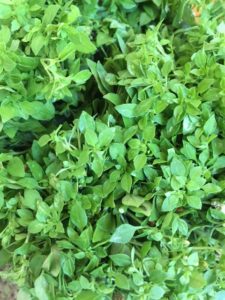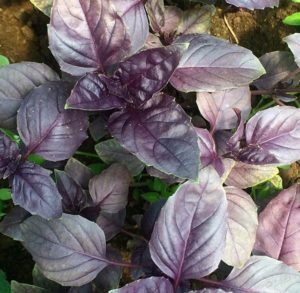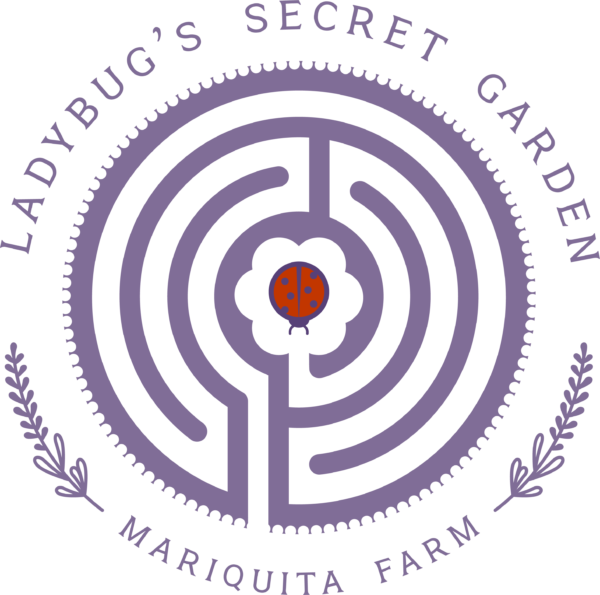Beware Beelzebub

Basil, the backyard gardener and amateur ethno botanist from Basel, took a step into the basilica of St Basil’s Cathedral, clutching a bunch of basil in his right hand. He glanced around, to the left and to the right, hurriedly, uneasily, and frequently, before advancing to the altar, as though there might be a basilisk lurking in the shadows. But why was Basil so timid and frightful? He, of all people, should have known that he was both armed, and armored, by the little bunch of herb in his hand.
Basil is not just an aromatic herb in the mint family. A lot of people don’t know this, but basil is the only cure for the bite of the basilisk. True, basilisks are extremely ferocious and cruel magical reptiles, ready and able to kill with just a glance, and they spread a wave of toxic venom in their wake, but they are helpless in the presence of basil in the same way that vampires can’t cope with garlic. The word basil in ancient Greek meant “monarch” or “Kingly.” But just as the basilisk earned its name and reputation as the “King of Serpents” by virtue of its deadly and uncanny powers – and because of the crown shaped crest on its head- so the most royal and powerful of herbs got named “Basil.” Basil, the good herb, trumps the basilisk, the evil serpent. And basil isn’t only good at counteracting the effects of basilisk venom. All manner of evil creatures are repelled by basil, from the common housefly to the Prince of Hell and the Lord of Flies, Beelzebub himself.
 Basil the gardener reached the altar and placed the bunch of basil from his garden next to an open Bible. When it came time the Priest could choose to use this herbal offering as a tender and aromatic wand with which to sprinkle holy water on the gathered worshippers. With the orthodoxy of the Greek Orthodox in mind, Basil had brought the tiny-leaved, sweet scented Greek basil to the basilica, not the muskier, more clove-like Tulsi basil that is revered in Hindu tradition as a manifestation of the Goddess Tulsi.
Basil the gardener reached the altar and placed the bunch of basil from his garden next to an open Bible. When it came time the Priest could choose to use this herbal offering as a tender and aromatic wand with which to sprinkle holy water on the gathered worshippers. With the orthodoxy of the Greek Orthodox in mind, Basil had brought the tiny-leaved, sweet scented Greek basil to the basilica, not the muskier, more clove-like Tulsi basil that is revered in Hindu tradition as a manifestation of the Goddess Tulsi.
Basil grew many kinds of basil in his garden back in Basel because there are many kinds of basil with many different uses. All basil varieties originally evolved in Southeast Asia, and in a warm tropical climate they can all be short-lived perennials. At home back in India, Tulsi basil can grow to be quite large and woody and those woody stems are carved into prayer beads. In ancient Greece and Rome there were basil varieties that were used in the manufacture of perfumes that were used by kings to mask their royal odors. Meanwhile, in a more Italian context, history tells us that vases of fresh basil were used by the romantically inclined as gifts to express the tender feelings they have for their lovers.
 Basel, in Switzerland, does not have the most appropriate climate for growing basil. So to grow his basil in Basel Basil used a greenhouse setup to get his plants through the cold winters of Central Europe. Besides the Tiny leafed Greek Basil, he also grew Purple or Opal basil, Lemon scented basil, Anise scented basil, and Genovese basil, but all under glass. The Swiss city was named Basel because it was once a Roman city, and the center of power in any Roman area was the basilica, where the monarch or king held court. Basil, the gardener, should have known that he too came into this world endowed with the name, meaning “kingly,” yet he fled the basilica of Saint Basil’s Cathedral like a thief, once he’d left his little bundle of basil on the altar. Why?
Basel, in Switzerland, does not have the most appropriate climate for growing basil. So to grow his basil in Basel Basil used a greenhouse setup to get his plants through the cold winters of Central Europe. Besides the Tiny leafed Greek Basil, he also grew Purple or Opal basil, Lemon scented basil, Anise scented basil, and Genovese basil, but all under glass. The Swiss city was named Basel because it was once a Roman city, and the center of power in any Roman area was the basilica, where the monarch or king held court. Basil, the gardener, should have known that he too came into this world endowed with the name, meaning “kingly,” yet he fled the basilica of Saint Basil’s Cathedral like a thief, once he’d left his little bundle of basil on the altar. Why?
I can only speculate, but perhaps Basil was fearful because he was a Western foreigner in Moscow, in Red Square, in the belly of the beast, so to speak. The original Saint Basil had been called “A Fool for Christ” and “The Wonderworker of Moscow” because he shoplifted to feed the poor, he went about naked in the streets, and he chastised the autocrat of the day, Ivan the Terrible, for being so terrible. The Moscow church that, ironically, was built by Ivan the Terrible became the most iconic structure in Russia and was named after Saint Basil to honor him for his humane instincts. But times have changed in Moscow and there’s a new Ivan the Terrible in town.
We’re all going to need a lot of basil going forward. Luckily, I’ve planted basil and this week we can enjoy our first harvest. With the onset of warm weather we should soon have a lot, but if you’re going to have a lot of something it might as well be basil. It’s such a useful herb; the mere scent of basil is uplifting. Basil can attract lovers and repel demons and flies. Basil is useful in religious ceremonies and may, in fact, be divine. Oh, and the Italians make pesto with it.
Get a bottle of our Everyday Extra Virgin Olive Oil grown from Belle Farms in Aptos, CA., pine nuts, a nice lemon and a fine loaf of sourdough bread and you are set for next week.
Enjoy!
Andy & the crew at Mariquita Farm.
© 2022 Essay by Andy Griffin
Photos by Andy Griffin


